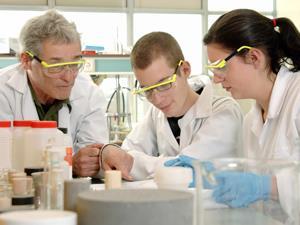Endpoint: Peter Borrows has the last word

As part of its Building Schools for the Future project, the Government in England is spending huge sums of money on building new schools and refurbishing old ones. To ensure this is wisely spent it has set up Project Faraday to develop exemplar designs for new laboratories that can then be replicated elsewhere. So far, so good. The problem is that some of those involved in creating these new designs have very little understanding of what science is about. As a result, some laboratories may not be suitable for one of the most fundamental aspects of science education, ie practical work.
Simulations not practical
I attended a conference at which one of those involved in the project talked about students learning how the human heart works by doing experiments on it. Experiments on the human heart? I don't think so, at least not in the sense the presenter meant. He was not talking about measuring the pulse rate before and after exercise, but rather about a darkened room, a virtual reality system, in which the effect of putting clots of blood in places could be explored. Now this may be quite a useful way of learning about the heart - but it is not an experiment. It is a simulation which has been pre-programmed into the computer. It became apparent to me, and quite frustrating, that many of those present at the conference - head teachers, governors, architects, government officials, local authority officers and - yes - a few science teachers - had no concept of what was meant by practical work. Perhaps the problem is that practical work is not a good name for it.
There are many types of learning activities that can take place in science lessons, some better (or more fashionable) than others. The teacher can ask questions of various sorts and the students respond. The students can make notes from a book or report what they have learned from a video. The teacher can give a lecture. The students can search for information on the Internet or work through a computer simulation. The students may do a role-play exercise. Valid and useful though these may be at improving students' knowledge of science, they do not, in my opinion, constitute practical work. Practical work requires test tubes, ammeters, microscopes and such like apparatus, whether used by the teacher in a demonstration or by the students themselves in the laboratory or in the field.
As soon as you try writing it down like this you hit a problem. As scientists, we know instinctively what we mean by practical work but the people outside science do not. Why is using a computer with sensors attached to record the temperature change during a chemical reaction practical work, when using a computer to simulate blood flow through the heart is not? The essence of science is that it is based on evidence, which is accumulated over time by using test tubes, ammeters, microscopes - and their more sophisticated modern equivalents. This is why 'creation science' and 'intelligent design' are not science. By showing students demonstrations using test tubes, ammeters, microscopes, or allowing them to do their own practical activities with these we are - or should be - showing them how science differs from almost everything else.
Practical reasons
Of course, not all school practical science is concerned with investigation and here I do think the National Curriculum has not been helpful in over-emphasising the role of investigation. Practical work may be done for a range of purposes. These might include:
- developing students' skills, eg using a burette requires practice;
- helping students' understanding, eg by doing a multi-stage organic synthesis and seeing how little of the final product they really end up with;
- helping students remember important ideas, eg comparing the dramatic reactions of lithium, sodium and potassium with water as a way to introduce periodic behaviour;
- inspiring students, eg by demonstrating the thermite reaction;
- and genuine investigations.
Naturally, much practical work is done for a mixture of reasons.
At one time, most of what I have been describing here we called 'experiments'. An old friend used to chide me when I talked about my class doing experiments. 'You know perfectly well what the outcome will be, so they are not experiments', he would say. If we all know what practical work is, what should we call it, if not experiments? And how do we explain the nature of the beast to a public which thinks a simulation is an experiment?
Dr Peter Borrows is a consultant and can be contacted at peter@borrows.demon.co.uk.






No comments yet